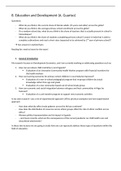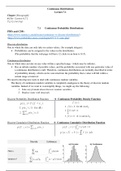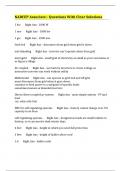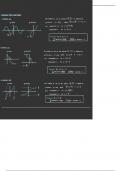Methods, Measurement & Statistics
Methods and Measurement lectures
Fall 2021
Lecture 1
Scientific questions
Scientific questions are questions that can be answered by making observations that identify the
conditions under which certain events occur. Still, to qualify as scientific knowledge, the answers to
such questions must take a particular form, a form that meets the requirements of description,
explanations, prediction, and understanding.
Product: logical structure of knowledge that tells us how and why (laws, principles, and theories)
Process: the methods and logic of inquiry through which the knowledge is created, tested, and refined.
Theory (theories) Propositions Hypotheses
Proposition: a general statement regarding a regularity in the behaviour or opinion of subjects
Example: “When an individual manages a particular task well, then (s)he will perform that
task better in the presence of others than when nobody else is present. (observation)
Theory: Provides an explanation for a proposition or a set of propositions
Example: biological, psychological, etc. (why)
Hypotheses: an expected relationship between two or more variables that can be tested.
Remember: this implies that it is applied to a context.
Remember: hypothesis should be measurable.
Example: Athletes will perform better the more spectators there are;
Example: Athletes will perform better the more journalists there are that will comment on
their performances.
Deduction
Theories hypotheses observations (data)
Induction
Observation (data) empirical generalizations Theory
Concept: a general/ abstract description of a social phenomenon.
Examples: weight, social status,
There should be agreed-on ways of tying them to observable objects or events.
Operationalization
Variable: empirical manifestation of a concept.
Characteristics of units that vary, taking on different values, categories, or attributes for
different observations
, Methods, Measurement & Statistics
Methods and Measurement lectures
Fall 2021
Hypotheses
Hypothesis: an expected relationship between two or more variables that can be tested.
Example: Men are on average more extravert than women.
1. Variables may have a different unit of analysis ecological fallacy.
2. Variables may have different measurement levels (important for wording of hypothesis and
vital for statistical analyses.
Types of hypotheses
1. Bivariate hypothesis: expected relationship between two variables
X Y
X = independent variable
Y = Dependent variable
= Direction of the effect
2. Multivariate hypothesis: expected relationship between a dependent variable Y and multiple
independent variables X1, X2, etc.
a. Relative importance: one of the variables might have a bigger effect than others.
X1 ++
Y
X2 +
3. Mediation/ interpretation: the effect of the independent variable (X1) on the dependent (Y) is
indirect through its effect on the intervening or mediating variable (X2) that in turn has an
effect on the dependent (Y)
X1 X2 Y
4. Partial mediation: The effect of X1 on Y is only partially explained by the mediator (X2)
X1 X2 Y
5. Moderation/ Interaction: the effect of X1 on Y is affected by X2; the effect of X1 on Y is
different depending on the value of the moderator X2; the effect of X1 on Y is conditional on
the moderator X2.
X1 Y
X2
Conceptual model: Graphical representation of a set of logically connected hypotheses.
Set hypotheses allow to draw the conceptual model
From a given conceptual model one can reconstruct the original hypotheses.
Methods and Measurement lectures
Fall 2021
Lecture 1
Scientific questions
Scientific questions are questions that can be answered by making observations that identify the
conditions under which certain events occur. Still, to qualify as scientific knowledge, the answers to
such questions must take a particular form, a form that meets the requirements of description,
explanations, prediction, and understanding.
Product: logical structure of knowledge that tells us how and why (laws, principles, and theories)
Process: the methods and logic of inquiry through which the knowledge is created, tested, and refined.
Theory (theories) Propositions Hypotheses
Proposition: a general statement regarding a regularity in the behaviour or opinion of subjects
Example: “When an individual manages a particular task well, then (s)he will perform that
task better in the presence of others than when nobody else is present. (observation)
Theory: Provides an explanation for a proposition or a set of propositions
Example: biological, psychological, etc. (why)
Hypotheses: an expected relationship between two or more variables that can be tested.
Remember: this implies that it is applied to a context.
Remember: hypothesis should be measurable.
Example: Athletes will perform better the more spectators there are;
Example: Athletes will perform better the more journalists there are that will comment on
their performances.
Deduction
Theories hypotheses observations (data)
Induction
Observation (data) empirical generalizations Theory
Concept: a general/ abstract description of a social phenomenon.
Examples: weight, social status,
There should be agreed-on ways of tying them to observable objects or events.
Operationalization
Variable: empirical manifestation of a concept.
Characteristics of units that vary, taking on different values, categories, or attributes for
different observations
, Methods, Measurement & Statistics
Methods and Measurement lectures
Fall 2021
Hypotheses
Hypothesis: an expected relationship between two or more variables that can be tested.
Example: Men are on average more extravert than women.
1. Variables may have a different unit of analysis ecological fallacy.
2. Variables may have different measurement levels (important for wording of hypothesis and
vital for statistical analyses.
Types of hypotheses
1. Bivariate hypothesis: expected relationship between two variables
X Y
X = independent variable
Y = Dependent variable
= Direction of the effect
2. Multivariate hypothesis: expected relationship between a dependent variable Y and multiple
independent variables X1, X2, etc.
a. Relative importance: one of the variables might have a bigger effect than others.
X1 ++
Y
X2 +
3. Mediation/ interpretation: the effect of the independent variable (X1) on the dependent (Y) is
indirect through its effect on the intervening or mediating variable (X2) that in turn has an
effect on the dependent (Y)
X1 X2 Y
4. Partial mediation: The effect of X1 on Y is only partially explained by the mediator (X2)
X1 X2 Y
5. Moderation/ Interaction: the effect of X1 on Y is affected by X2; the effect of X1 on Y is
different depending on the value of the moderator X2; the effect of X1 on Y is conditional on
the moderator X2.
X1 Y
X2
Conceptual model: Graphical representation of a set of logically connected hypotheses.
Set hypotheses allow to draw the conceptual model
From a given conceptual model one can reconstruct the original hypotheses.










